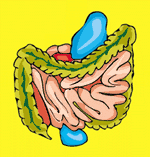The Acid Alkaline Balance
of Body Fluids
"Even though liquid ACV is acidic,
its ash leaves an alkaline residue!"
There is an acid alkaline balance continuously operating in our body's fluids.
Our blood is mildly alkaline (pH 7.4) and changes very little with food intake. That is because our blood is a buffered system.
For our body to do this, excess acid in the blood is neutralized by calcium released by our bones and excess base is neutralized by carbonic acid obtained from the carbon dioxide in the air we breathe. As a result our bloodstream's pH stays right between 7.35 and 7.45 regardless of the food we eat.
Thats a good thing since many of the enzymes that do crucial work within every cell of our body require just the right pH to do their jobs.
The pH of the body's digestive track fluids such as urine and saliva, on the other hand, are not buffered and can (and do) change with the amount and type of food we eat.
As a result many physicians and nutrition researchers promote theories related to food intake and how that effects the acid alkaline balance in our body, and its relation to our health.
Certain foods leave an acid or alkaline residue once they are completely burned to ash. This is a function of the type and amount of minerals present in the food. Apple cider vinegar, because of its calcium and potassium mineral content leaves an alkaline residue once it is burned even though the original liquid is an acid.
In the 1950's Dr D.C. Jarvis studied the effect of taking apple cider vinegar on the acid alkaline balance of urine and published his findings in a book called Folk Medicine: A New England Almanac of Natural Health Care from a Noted Vermont Country Doctor
In this book Dr Jarvis describes how he was able, by rigorous urine sample testing, to find patterns in the acid alkaline balance of the body as a response to illness.
He did this by following 24 subjects for 2 years using urinalysis as a diagnostic tool. Each subject tested their urine pH first thing in the morning and then before the evening meal and all results were kept in a daily log along with the food eaten for each of the three meals.
(pH test paper for testing urine or saliva at home can be obtained online or at most local drug stores.)
Dr Jarvis observed that his subjects urine acid alkaline balance shifted to alkaline when they were in the early stages of illness even before they were aware of any symptoms. For example when a cold was developing, when a sinus attack was approaching and when allergies or asthma was about to act up.
By drinking apple cider vinegar to fight the onset of these illnesses he observed that his subjects' urine would rapidly return to its normal acid pH range.
The benefits of apple cider vinegar were attributed by Dr Jarvis to its organic acids and high potassium content.
After further observations on both people and ailing farm animals he also recommended the regular use of apple cider vinegar to help combat such chronic conditions as high blood pressure , arthritis and overweight.






